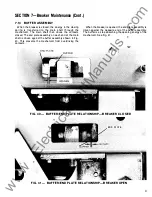
SECTION 7-Breaker Maintenance (Cont.)
The mechanism i s reset by disengaging the side latch
l ink from the upper latch link or by closing the breaker if a
locklever is not provided. The side latch link, is activated
only by pushing the TRIP button or operating the shunt trip.
A slide attachment on the TRIP button shaft moves
against the side latch link when the TRIP button is pushed.
This slide attachment is factory adjusted to activate the
side latch before the breaker is tripped. A second arm on
the shunt trip also activates the side latch l ink when the
shunt trip is energized.
7.1 1 .2
ADJUSTMENTS
If a breaker is equ ipped with a bell alarm/lockout device
originally, all the adjustments are made at the time of
assembly. Switch operation is controlled by means of
shims of insulating material placed between the switch
body and the bracket to which it is fastened. The adjust
ment screw is positioned so that when the locklever is in its
activated position, it holds the breaker mechanism latch in
the tripped position.
Check that TRIP button shaft and shunt trip operations,
besides tripping the breaker, displace the side latch and
prevent the bell alarm switch from operating. The other trip
devices and interlocks must activate the bel l alarm when
they open the breaker.
The bracket assembled to the TRIP button shaft must be
adjusted so that it will displace the side latch when or
before the shaft opens the breaker. Maintain a .030 inch
minimum gap between the bracket and the side latch when
the breaker is closed. A .187 inch depression of the TRIP
button must not trip the breaker, but a .375 inch depres
sion must trip the breaker and displace the side latch .
W R E LAY
X-RELAY
7.1 1 .3
REPLACEMENT
The bell alarm is mounted on the right hand side of the
breaker at the rear of front frame. It is located under the
mechanism main shaft.
The bel l alarm is removed by passing it through a cutout
in the rear bend of the front frame, slipping it between the
front frame and trip shaft and out through the bottom of the
breaker as follows:
1 . Remove the 4 bel l alarm mounting screws from the
bottom of the front frame.
2. If the crank which is part of the main shaft has a bell
alarm activating pin assembled to both sides, remove these
pins.
3. Insert the flat of the maintenance handle between the
top of the left hand side buffer block and the end plate
assembly. This should eliminate any interference from the
main shaft during the bell alarm removal.
4. The trip shaft must be moved to allow the bell alarm to
fit beteen it and the front frame. Remove the retaining ring
holding the right hand trip shaft bearing to the mechanism
frame. Slide the bearing from the frame and along the trip
shaft. There will now be enough trip shaft movement to slip
the bell alarm past.
5. Install the replacement bell alarm in reverse order.
6. Check the adjustments g iven in Section 7.1 1 .2
A bel l alarm with a lockout assembly or a bell alarm i n
stalled on a 2000 amp frame (AKRT 50/SOH) breaker may not
work with the above procedure. If this is the case, the
breaker front and back frame will have to be seperated.
7.1 2
ELECTRICAL CONTROL COMPONENTS
The operation of the electrical control components is
described in Section 5.2. The location of these components
is shown in Fig. 36A.
CHARGING
MOTOR
G SWITCH
FIG. 36A - ELECTRICAL CONTROL COMPONENTS
27
www
. ElectricalPartManuals
. com








































